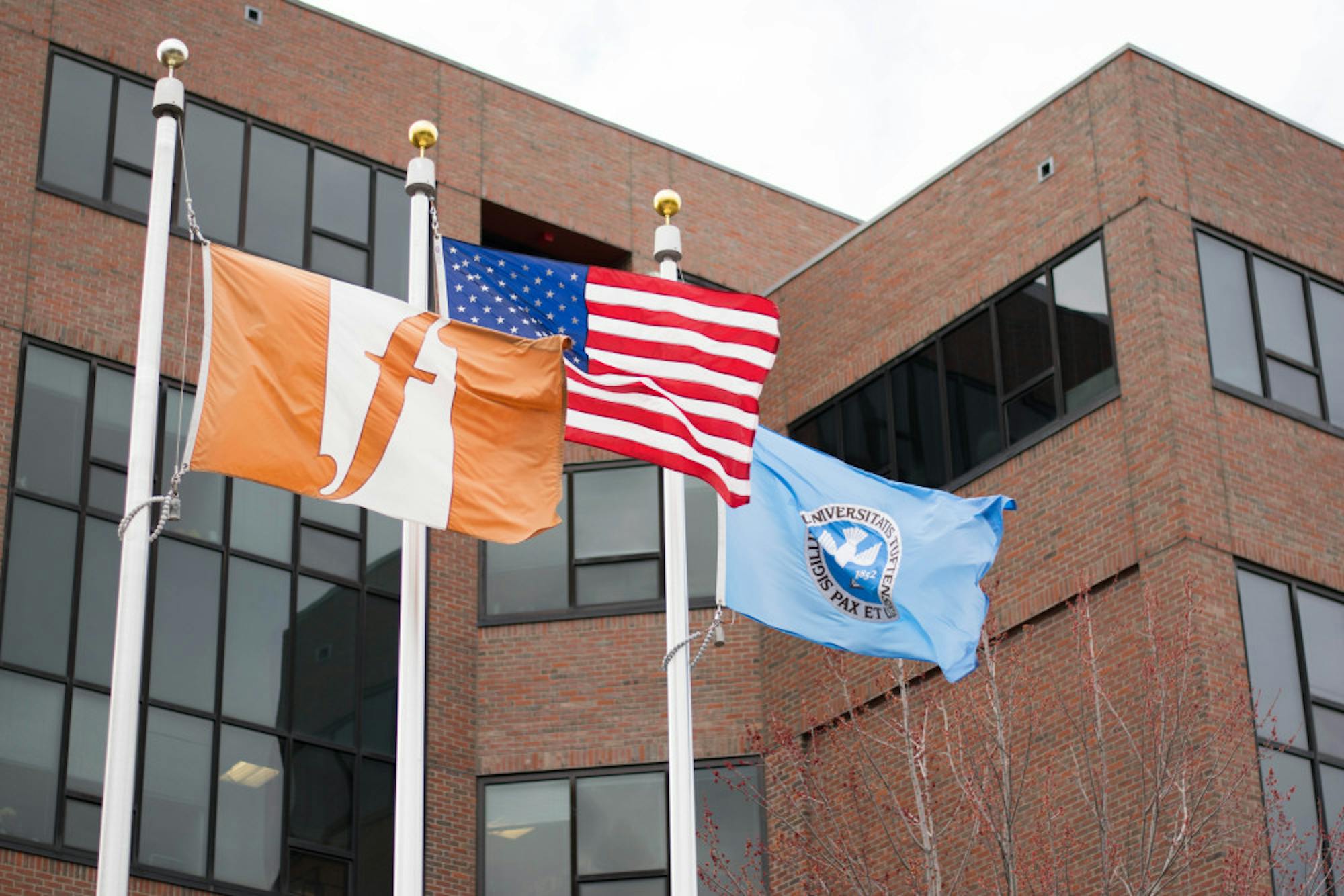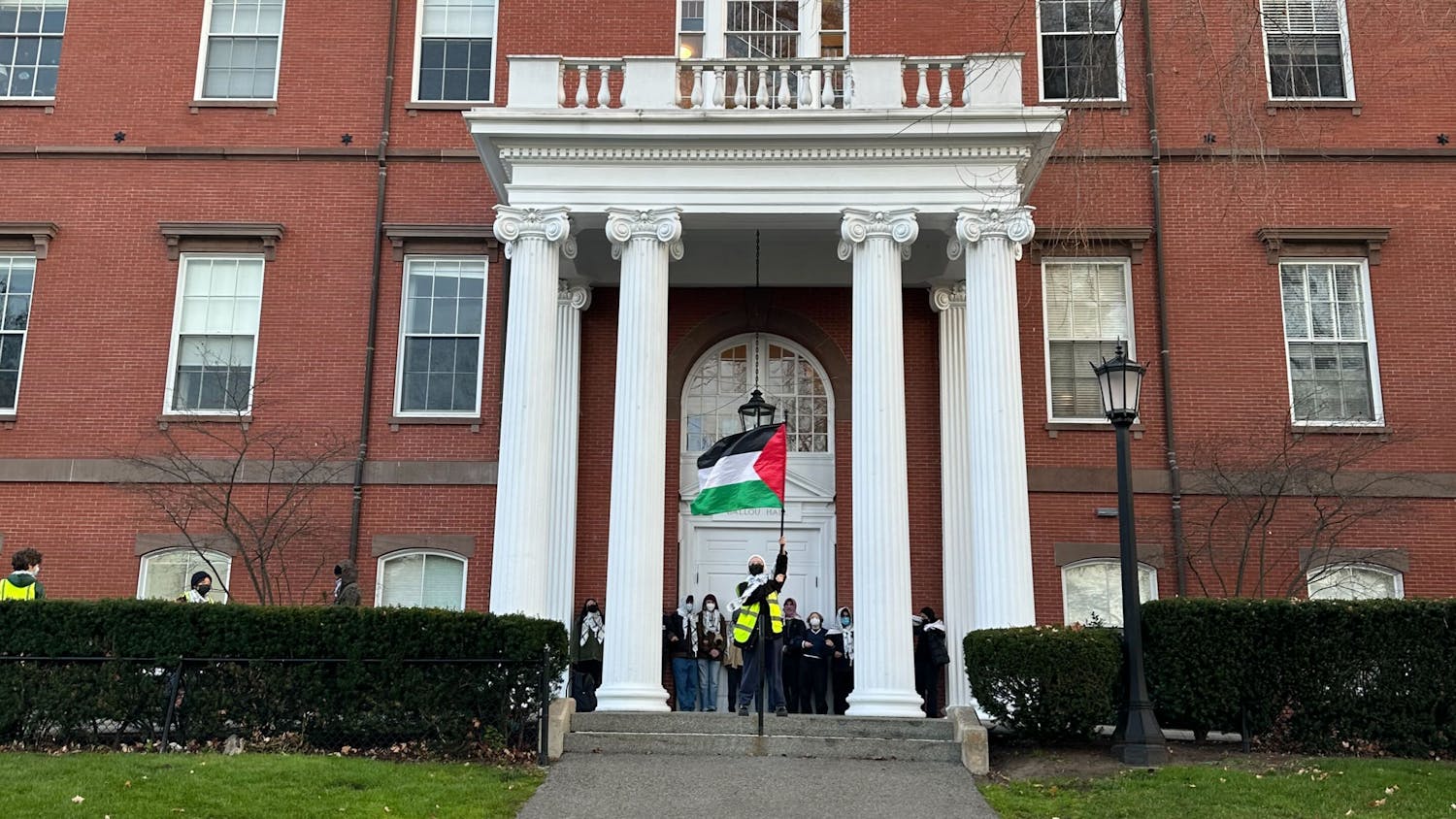Editor’s note: This is the second part in a four-part series from the Daily’s Investigative Team. Part 1, Part 3 and Part 4 can be found online.
The seven organizations featured in this investigation, all of which have donated to Tufts since 1985, have funded highly provocative and academically controversial research and publications at universities across the United States. These foundations’ funding efforts supported racially and religiously inflammatory media campaigns and scholarship.
John Templeton Foundation (Donations to Tufts: $6,699,828)
The John Templeton Foundation funded the now-closed Cultural Change Institute at The Fletcher School of Law and Diplomacy, founded in 2007 by former Fletcher adjunct professor and senior research fellow Lawrence Harrison, who has a history of racially divisive scholarship.
In his 1985 book, “Underdevelopment is a State of Mind: The Latin American Case,” Harrison argued that black slaves in Barbados benefited culturally from their enslavement due to the ‘noble’ acts of their British masters, leading to greater economic development, especially when compared to countries like Haiti.
“The [Barbadian] slaves were beneficiaries of significant acts of English noblesse oblige starting early in the eighteenth century,” Harrison wrote.
In an email to the Daily, former Fletcher professor Miguel Basáñez, who was named director of the Cultural Change Institute following Harrison’s retirement in 2010, refuted Harrison's analysis of Barbados’ contemporary success relative to Haiti, saying he failed to consider the U.S. blockade of Haiti, which occurred after the country gained its independence from France in a slave rebellion.
Richard Lerner, a professor in the Eliot-Pearson Department of Child Study and Human Development, directs Tufts’ Institute for Applied Research in Youth Development, which receives funding from the Templeton Foundation. Lerner, who has intermittently served as a member of the Templeton Foundation’s Board of Advisors since 2003, called Harrison’s views “abhorrent” if true but ultimately unrepresentative of the Templeton family.
“Let me say this in their defense: Knowing the late Jack Templeton, knowing the staff that still is there and knowing the Templeton family, they have not a bone of racial animosity or prejudice in them, and I've seen them in numerous contexts defending racial diversity ... that being said, I find [Harrison’s] ideas more than objectionable — I find them abhorrent, frankly,” Lerner said.
The Templeton Foundation also funded Harrison’s 2013 book, “Jews, Confucians, and Protestants: Cultural Capital and the End of Multiculturalism,” in which he wrote that “black subculture, not racism and discrimination, was the principal cause of black underachievement.”
In a 2008 Christian Science Monitor opinion piece, Harrison identified the “Anglo-Protestant cultural tradition” as a way to create “homogeneity” to promote social progress.
Basáñez said that Harrison was a long-standing academic collaborator and a personal friend of Samuel Huntington, who was the Albert J. Weatherhead III University Professor at Harvard University and shared Harrison’s views on Latin Americans in the United States.
“What that [collaboration] made them both is to become very much anti-migrant and very much despising Latin people and Latinos in the U.S.,” Basáñez said.
When asked about Harrison and the Cultural Change Institute, Templeton Foundation’s senior vice president of programs, Michael Murray, told the Daily in an email that the foundation values “open-mindedness” in all of the fields it supports.
“We truly believe in the values of open-mindedness, humility, and civil, informed dialogue across disciplines,” Michael Murray said. “To that end we fund cutting-edge research from physics to philosophy, on complexity, genetics, and consciousness, and within different faith traditions around the world.”
Lupita Ervin, an administrative coordinator at Fletcher who worked as an assistant to Harrison, did not respond to the Daily’s request for comment.
In addition to funding racially divisive research at Fletcher, the Templeton Foundation has also supported controversial research led by Herbert Benson, director emeritus of the Benson-Henry Institute at Massachusetts General Hospital. Benson’s research investigated whether prayers can heal the sick even if patients are unaware that they are being prayed for, according to a simplified copy of the study’s trial report published in the American Heart Journal in 2006. The trial ultimately concluded that prayers had no direct effect on patient recovery.
“Intercessory prayer itself had no effect on complication-free recovery from CABG [heart surgery], but certainty of receiving intercessory prayer was associated with a higher incidence of complications,” the study found.
The study cost $2.4 million and was largely funded by the Templeton Foundation, according to a 2006 article published in the Scientific American magazine.
Lerner said he was unaware of the organization's funding of intercessory prayer research.
The Templeton Foundation has also supported college classes and conferences in which intelligent design was debated as scientific theory, according to a 2011 Nature article written by former Nature editor Mitchell Waldrop.
“Other Templeton grants supported a number of college courses in which intelligent design was discussed,” Waldrop wrote. “Then, in 1999, the foundation funded a conference at Concordia University in Mequon, Wisconsin, in which intelligent-design proponents confronted critics.”
After these conferences concluded, the Templeton Foundation asked proponents of intelligent design to submit research proposals, but no proponents took the foundation up on its offer according to statements made by the organization’s former senior vice president Charles L. Harper Jr. to The New York Times in 2005.
“They never came in,” Harper said. “From the point of view of rigor and intellectual seriousness, the intelligent design people don't come out very well in our world of scientific review.”
Harper added that other members of the Templeton Foundation were initially intrigued about funding research of intelligent design but ultimately became disillusioned with the subject.
Waldrop pinpointed the onset of the foundation’s waning interest in such research to the early 2000s, when it became evident that intelligent design is a politically informed, unscientific theory.
“Disillusionment set in — and Templeton funding stopped — when it became clear that the theory was part of a political movement from the Christian right wing, not science," Waldrop said.
Academics who argued in favor of intelligent design on college campuses were already being discredited by their peers, according to The New York Times' national religion correspondent Laurie Goodstein.
“On college campuses, the movement's theorists are academic pariahs, publicly denounced by their own colleagues,” Goodstein wrote. “It has gained little support among the academics who should have been its natural allies.”
Lerner told the Daily that he believed the Templeton Foundation funded research to counter intelligent design’s “anti-scientific view of evolution,” not to support research in favor of it, when he accepted money from the organization.
Waldrop highlighted the changes that the Templeton Foundation made to its peer review process in the years before it began donating to Tufts, specifically the foundation’s assignment of program officers to oversee each of its major topics of focus.
“It remains to be seen how reassuring these changes will be for scientists still sceptical of the foundation — although Marsh notes that last year's inaugural announcement of 13 funding priorities drew some 2,500 submissions,” Waldrop wrote in his 2011 Nature article.
The Templeton Foundation funded Harrison’s racially provocative scholarship until 2013.
Jack Templeton, chairman and president of the Templeton Foundation from 1995 to 2015, also donated $900,000 out of his own pocket to support the National Organization for Marriage and ProtectMarriage.com during the 2008 California Proposition 8 campaign, according to the state's campaign finance records. These groups ran anti-LGBTQads during the campaign that argued in favor of banning same-sex marriage in California.
Lerner said that he was unaware of Jack Templeton’s involvement with these groups. When asked what he thought of these funding efforts, Lerner added that the donations were made from Jack Templeton’s personal account rather than from the foundation.
Charles Koch Foundation (Donations pledged to Tufts: $3,000,000)
The Charles Koch Foundation’s purchase of a large electronics company that produces technology for drones and other unmanned military vehicles raises questions about the foundation’s motives for donating $3 million to establish Fletcher’s Center for Strategic Studies (CSS).
The Koch brothers acquired the company Molex in 2013 for $7.2 billion. Molex develops and manufactures a multitude of defense technology, including aircraft radar and communications systems, missile guidance systems and unmanned vehicle monitoring systems, according to the company’s 2015 product report.
Included in the CSS’ stated mission is the exploration of strategies to “enhance US security, sovereignty, prosperity, and territory” and to “question the utility of military intervention given its potential perils and long-term unintended consequences; including but not limited to, the loss of life, civil liberties, and resources.”
CSS Director Monica Toft said she was unaware of Koch Industries’ 2013 acquisition of Molex and added that she believes her research is “extraordinarily important” and saves lives, regardless of donor intent.
Ralph Wilson, co-founder of UnKoch My Campus, said that the Koch brothers’ support of the CSS suggests that the Charles Koch Foundation is funding research that advances its own private interests.
“Considering [the Koch brothers’] profit motive in unmanned aerial vehicles … to me, the ‘Occam's razor’ cheapest, easiest explanation would be they're advocating for what might be foreign intervention with less of a human cost that would also profit them,” Wilson said.
The Koch brothers have also funded a network of organizations engaged in efforts to reject climate change scholarship. As a result, Robert Brulle, professor of sociology and environmental science at Drexel University, identified the Charles Koch Foundation as a supporter of the “climate change counter-movement” in a 2010 study.
“The efforts of the [climate change counter-movement] span a wide range of activities, including political lobbying, contributions to political candidates, and a large number of communication and media efforts that aim at undermining climate science,” Brulle wrote.
From 1987 to 2015, the Charles Koch Foundation donated nearly $350,000 to the Atlas Economic Research Foundation (AERF), according to Greenpeace. AERF, now known as the Atlas Network, co-sponsored an event in 2010 that was dedicated to the idea that global warming “is not a crisis,” according to its website.
The Charles Koch Foundation has also provided tens of thousands of dollars to the John Locke Foundation, which has consistently lobbied against climate change-related policy efforts, according to a 2010 report written by Sue Sturgis, editorial director of the Institute for Southern Studies.
“The Locke Foundation distributed to all members of the [North Carolina] state legislature the Michael Crichton novel ‘State of Fear,’ a work of fiction that promoted the views of Dr. S. Fred Singer, a prominent climate skeptic,” Sturgis wrote.
Brulle also identified The Lynde and Harry Bradley Foundation, Earhart Foundation, Sarah Scaife Foundation and Smith Richardson Foundation as donors to the “climate change counter-movement,” based on their funding of the AERF, among other organizations. These four foundations have donated a total of nearly $10 million to Tufts since 1985.
Brulle added that all of them, with the exception of the Smith Richardson Foundation, have donated millions of dollars to the Heritage Foundation, which picked data out of context from a 2010 Royal Society report to argue that scientists are uncertain about the existence of anthropogenic climate change, according to Greenpeace.
Smith Richardson Foundation (Donations to Tufts: $1,193,017)
The Smith Richardson Foundation has directly contributed to racially provocative research at Tufts. Marin Strmecki, senior vice president and director of programs at the Smith Richardson Foundation, suggested that Lawrence Harrison establish the Cultural Change Institute at The Fletcher School, according to Harrison’s 2013 book, “Jews, Confucians, and Protestants: Cultural Capital and the End of Multiculturalism.” The Smith Richardson Foundation also contributed funding to Harrison’s book, which contained racially divisive statements.
The Smith Richardson Foundation has funded discriminatory publications at other universities. In the 1980s, the Smith Richardson Foundation teamed up with the Earhart Foundation and the John M. Olin Foundation to fund the Dartmouth Review, which outed members of Dartmouth College’s Gay Student Alliance after obtaining the correspondence files of several of the alliance’s members, according to a 1981 article in The New York Times. Tufts has received $1,413,008 from the Earhart Foundation and $1,626,051 from the John M. Olin Foundation.
“One student named, according to his friends, became severely depressed and talked repeatedly of suicide,” the article said. “The grandfather of another who had not found the courage to tell his family of his homosexuality learned about his grandson when he got his copy of The Review in the mail.”
The Dartmouth Review also mocked black students in an editorial written in Ebonics, according to journalist Jane Mayer in her 2016 book, “Dark Money.”
The Smith Richardson, Sarah Scaife and John M. Olin foundations all continued to indirectly support the Dartmouth Review after these incidents through their contributions to the Collegiate Network, which provides funding for the Dartmouth Review to this day, according to the network’s website.
The Lynde and Harry Bradley Foundation (Donations to Tufts: $1,018,250)
Outside of Tufts, the Bradley Foundation has also supported scholars and publications accused of promoting discredited and racist research.
In 2016, the Bradley Foundation awarded a Bradley Prize worth $250,000 to Charles Murray, the F.A. Hayek Emeritus Chair in Cultural Studies at the American Enterprise Institute, whose 1994 book, “The Bell Curve,” also funded by the foundation, proposed that black people might have inherently lower IQs than white people due to genetic differences.
“Another line of evidence pointing toward a genetic factor in cognitive ethnic differences is that blacks and whites differ most on the tests that are the best measures of ... general intelligence,” Charles Murray said.
The Southern Poverty Law Center stated on its website that Charles Murray uses “racist pseudoscience” to support discredited academic research.
“Charles Murray ... has become one of the most influential social scientists in America, using racist pseudoscience and misleading statistics to argue that social inequality is caused by the genetic inferiority of the black and Latino communities, women and the poor,” the center's website said.
The Daily repeatedly reached out to Richard Shultz, director of the International Security Studies Program at Fletcher, to discuss the Bradley Foundation’s continued funding of Charles Murray and the program’s acceptance of the foundation's donations, but Shultz declined to comment.
Liam Knox contributed reporting to this article.
Correction: A previous version of this article incorrectly stated the publication year of Jane Mayer’s book “Dark Money.” The book was published in 2016, not 2017. The Daily regrets this error.
Dark Money at Tufts, Part 2: University donors support discriminatory, discredited scholarship

The Fletcher School of Law and Diplomacy, home to the Center for Strategic Studies and the now-closed Cultural Change Institute, is pictured on April 20, 2018.





